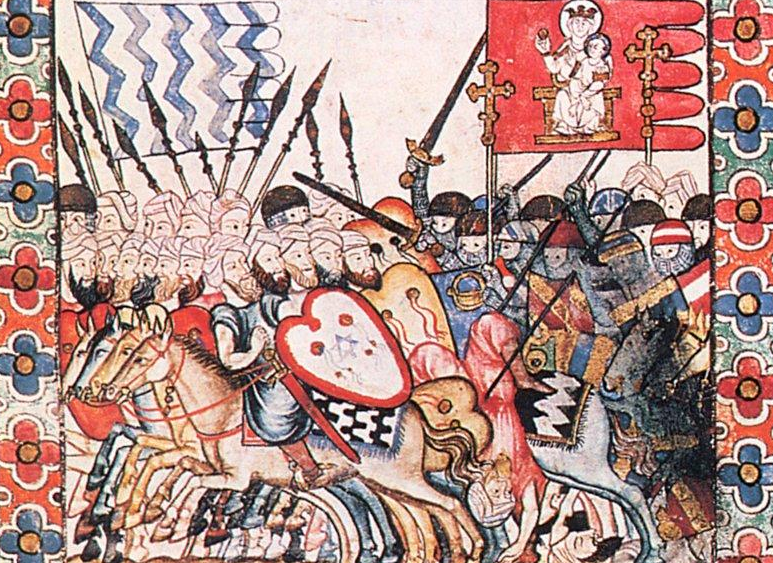There are three types of explanations for this decline. The first of these emphasizes external factors, like the Mongol invasion in 1258 and the loss of territory in Islamic Spain to the Christian Reconquista. For example, Lindberg (2007) and Hillel Ofek’s online article Why the Arabic World Turned Away from Science mention these factors.
The second type of explanation points to internal political factors, in particular to upheavals, political infighting and territorial fragmentation. Hillel Ofek’s online article Why the Arabic World Turned Away from Science names these events – together with the external factors mentioned above – as the “most significant factor”.
The third type of explanation also focuses on internal factors and it emphasizes the role of the Islamic religion, in particular the Asharite school of Islamic theology and the Islamic scholar al-Ghazali. Reilly (2010) and Weinberg (2015) blame this factor for the decline. Hillel Ofek’s article Why the Arabic World Turned Away from Science also attaches great importance to it as part of the explanation for the demise of philosophy and science in Islam.
All these factors might have had a role. Furthermore, they might have interacted with each other. For example, political infighting among Muslim elites might have made it easier for external enemies, like the Christian rulers of the Spanish Reconquista, to grab Muslim territory.
But the question is, how important were each of these factors, really?
Mongol invasion in 1258
Though the Abbasid caliphate had been in decline for some time by the 13th century, Baghdad, its capital, was still one of the biggest cities on Earth, a center of economic and cultural activity.
The Mongols extended their rule towards Europe, central Asia and the Middle East beginning of the 13th century, and in 1258 they attacked Baghdad under Hulagu Khan. They took Baghdad beginning of that year, after only a few days of siege. A week of extreme violence against the population followed, during which much of the city – including its libraries containing large numbers of manuscripts – was destroyed.
Though the Mongol invasion has severely affected science in Baghdad and in other parts of the Islamic domain, history shows that countries and even cultures can quickly recover from devastating but relatively short-duration events. As an example, the Black Death epidemic in the middle of the 14th century killed 30-60% of Europe’s population. This devastation didn’t stop scientific inquiry or any other creative activity in Europe. On the contrary, the flourishing of European Renaissance followed shortly thereafter.

Also, there was in fact a recovery of scientific activity in the thirteenth century—the century when the Mongol invasion happened. This has to do with the establishment of the Maragha observatory in northeast Iran in 1259, supported by the Mongol conqueror Hulagu Khan, just one year after he sacked Baghdad. The famous mathematician and astronomer Nasir al-Din al-Tusi worked at the observatory, together with many other scholars.
Furthermore, though the Mongols destroyed the Baghdad library—the largest library in the world at that time—, many of the books were available in copies in other places not touched by the Mongol invasion, for example in Islamic Southern Spain.
Lastly, as the charts in Part 4 of this article series indicate, the decline started already up to 200 years before the Mongol invasion.
Thus, the Mongol invasion, though it might have contributed to the decline, was not the decisive factor in it.
Loss of territory in Spain
Another historical development sometimes connected to the decline is the loss of territory of Islamic Spain to Christian rulers over time. Toledo was lost in 1085, Cordoba in 1236, Valencia in 1238, and Seville in 1248. It is true, this interrupted Muslim intellectual activity in these conquered, previously culturally rich areas.

By Alfonso X
But, the Emirate of Granada in Southern Spain survived for about 250 more years after the fall of Seville. It was a prosperous state: Granada, its capital, was the biggest city in Europe in 1450. It was also a Muslim cultural center. The web site Muslim Heritage writes this about Granada:
A large number of Muslim scholars moved between Granada and North Africa. The historian Ibn Khaldun, the philologist Abu Hayyan, Ibn Battuta, and the vizier-cum-litterateur Ibn al-Khatib frequented this court.
Northern Africa, including Egypt, remained in Muslim hands for many hundreds of years, and the powerful Ottoman Empire in the East started its expansion soon after the Mongol invasion, capturing culturally rich areas from Christians.
Thus, it is not plausible to assume that the loss of territories in Spain would have had much role in causing the decline of Islamic philosophy and science.
Political upheavals and fragmentation
It is true: there were frequent upheavals in Muslim areas, which did interrupt normal life periodically.
But political upheavals abounded in Europe, too. This included many wars inside Europe—some of them long lasting like the 100 Years War between England and France during the 14th and 15th centuries and the devastating 30 Years War in Germany in the 17th century.
These upheavals didn’t halt the steady progress of science in Europe. There is no reason to think that political upheavals would have had a different effect in the Islamic world. The same can be said about the gradual “fragmentation” of the Abbasid empire: the Christian world was also very fragmented, but this didn’t lead to the decline of science there. In fact, the Reformation movements in the 16th century—causing large divisions in European society—just preceded the Scientific Revolution.
Also, relative political stability soon returned in the Islamic world after the demise of the Abbasid caliphate—at the latest when the Ottoman empire was established. This, however, didn’t result in a recovery of scientific productivity.
The Asharites and al-Ghazali
The Islamic religion is a monotheism, a belief in a single, almighty, all-knowing God – just like Christianity and Judaism.
From early on, Islamic theology developed in different directions. One of these were the “Asharites”, started by Abu al-Hasan al-Ashari during the 10th century. An important doctrine of theirs was an extreme occasionalism, meaning the belief that anything that happens in nature is caused directly by God. Thus, the only causal agent is God, natural causes do not exist.
Abu Hamid Al-Ghazali (1058-1111) was the most important of the followers of this school. His formulation of Asharite occasionalism became famous and he eloquently attacked the rationalistic philosophy of his time.

The Book of Belief for Children
The Asharites became increasingly popular, and the argument is that their occasionalist ideas and their attacks against rationalistic philosophy caused, over time, scientific inquiry to diminish.
This appears plausible – an extreme occasionalism like that, endorsed by highly influential figures like al-Ghazali, would probably severely hinder scientific inquiry in any society. Also, this explanation has the advantage that it invokes the role of ideologies and systems of ideas which, though acting more slowly than dramatic events like the Mongol invasion in 1258, can influence society potentially much more deeply.
However, the Asharites were not the only ones promoting this kind of occasionalism. In fact, the Mutazilites — often hailed as an early rationalistic school of thought in Islam — developed very similar ideas, too (Martin et al., 1997). Furthermore, there were other schools of Islamic thought — e.g. the Hanbalites — the ideas of which might have been similarly detrimental for science and philosophy. Lastly, similarly to Islam, Christianity also believes in a single, almighty, all-knowing God — but it did not develop an extreme occasionalism of the Asharite type.
Thus, blaming the Asharites and al-Ghazali alone for the decline of science and philosophy in Islam is shortsighted.
Avoiding the question
Finally, another approach to the question about the reasons for the decline is to avoid the question altogether. Science historian David C. Lindberg writes:
Perhaps the question that we ought to be asking is not “Why or when did Islamic science decline?” … but “How is it that an intellectual tradition that began in such unpromising circumstances developed an astonishing scientific tradition that endured as long as it did?”
Lindberg, 2007, p. 191
An amazing attitude from a historian of science.
Thus, none of the explanations for the decline of science and philosophy in Islam, mentioned above, is fully satisfactory. The influence of the Asharites and al-Ghazali seems the most plausible and most important factor, but it is not a full explanation.
In the next Parts of this series there will be an attempt to improve on this explanation.
Literature
Lindberg, D. C. (2007). The Beginnings of Western Science. The European Scientific Tradition in Philosophical, Religious, and Institutional Context, Prehistory to A.D. 1450. Second Edition. Chicago: The University of Chicago Press.
Martin, R. C., Woodward, M. & Atmaja, D. S. (1997). Defenders of Reason in Islam: Mu’tazililism from Medieval School to Modern Symbol. London: OneWorld Publications. Kindle Edition.
Reilly, R. R. (2010). The Closing of the Muslim Mind. Wilmington: ISI Books.
Weinberg, S. (2016). To Explain the World: The Discovery of Modern Science. New York: Harper Perennial.
To be continued

Be the first to comment on "How science lived in Europe and died in Islam, Part 5: Why the decline of philosophy and science in Islam?"